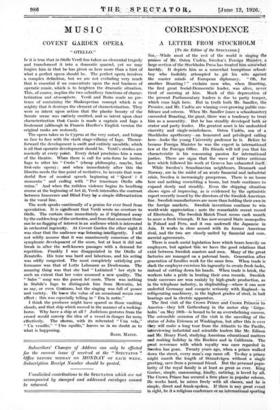M U S IC
COVENT GARDEN OPERA.
OTELLO."
IF it is true that in Otello Verdi has taken an elemental tragedy and transformed it -into a domestic quarrel, yet we may forgive him in that he has given us here more than a hint of what a perfect opera should be. The perfect opera involves a complex definition, but we are not excluding very much that is essential if we concentrate upon the real business of operatic music, which-. is to heighten the dramatic situation. This, of course, implies the two subsidiary functions of charac- terization and atmosphere. Verdi and Boito made no pre- tence of containing the Shakesperian concept which is so mighty that it destroys the element of characterization. They were so intent upon action that the plastic beauty of -the Senate scene was entirely omitted, and so intent upon clear characterization that Cassio is made a captain and Iago a lieutenant (although-in Francis Hueffer's English version the original ranks are restored).
The opera takes us to Cyprus at the very outset, and brings us face to face with the stark stage-villainy of Iago. Thence- forward the development is swift and entirely unsubtle, which is all that operatic development should be. Vetcli's strokes are masterly at every paint. Every detail proclaims him a man of the theatre. When there is call fcir aria-form he incites !ago to utter his " Credo " (cheap philosophy, maybe, but first-rate opera).; and when immediately after this the libretto needs the fine point of recitative, he invents that won- derful flow of musical speech beginning at Quest' 6 il moment° " and ending with "Per traseinare Otello alla ruina." And when the ruthless violence begins its headlong course at the beginning of Act iii, Verdi intensifies the contrast between Innocence and Blind Fury Ivy a simple differentiation in the vocal line.
The work speaks continually of a genius for ever freed from speculation. It is significant that Verdi wrote no overture to Mello. The curtain rises immediately as if frightened away by the sudden leap of-the orchestra, and from that moment there can be no flagging of interest in an audience which is interested in orchestral ingenuity. At Covent Garden the other night it was clear that the audience was listening-intelligently. I will not wildly assume that it was unanimously conscious of the symphonic development of the score, but at least it did not break in after the well-known passages with a demand for repetition. Frankly I was disappointed in the Otello of Zenatello. His tone was hard and laborious, and his acting was oddly congested. The most completely satisfying per- formance was that of Lotte Lehmann as Desdemona. The amazing thing was that she had " Latinized " her style to such an extent that her voice assumed a new quality. The " Sake " song was the purest bel canto. There was nothing in Stabile's Iago to distinguish him from Mercutio, let us say, or even Gratiano, but the singing was full of power and variety. Re knew the value of an occasional mezza voce effect : this was especially telling in "Era la notte."
• I- think the producer might have spared us those vaulting clouds, and that ship which moved in the manner of a rocking- horse. Why have a ship at all ? Judicious gestures from the crowd would convey the idea of a vessel in danger far more effectively. The chorus, with its reiterated "Una vela," "Un vessillo," " Llno squillo," leaves us in no doubt as to what is happening.
BASIL MAINE.






















































 Previous page
Previous page